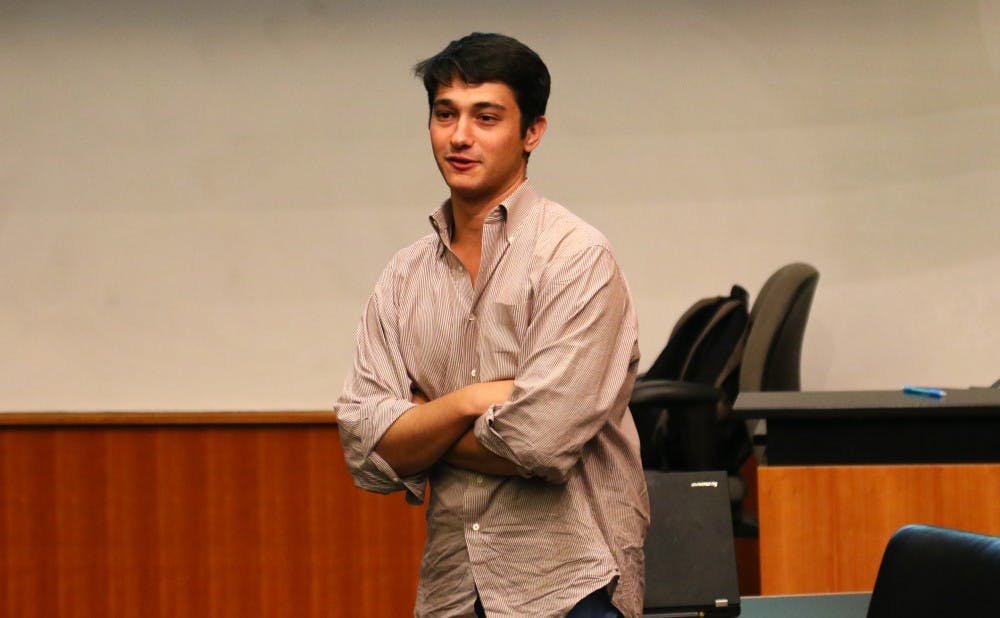At its meeting Wednesday, Duke Student government reviewed the DevilsGate Main Quad proposal and passed a statute to create the Gatekeepers, a group of 20-30 DSG affiliates who will be in charge of organizing a new DevilsGate Tailgate before Duke football home games and leading the student section this season.
The DevilsGate program involves creating a safe and open space on the Main West Quadrangle that will enhance the gameday experience for students, explained senior Bryan Dinner, vice president for social culture.
“[DevilsGate] provides a huge space to support Duke football, which is now an elite program, but is also an open, inclusive Duke community building space, which is something Duke students want,” said Dinner, who introduced the proposal.
Because the previous tailgate program was discontinued in 2010 after a minor was found unconscious in a Porta Potty, a major focus of DevilsGate Tailgate will be the alcohol policy. As part of the program, DevilsGate will provide 19 tents for any registered student organization to use, and groups wishing to reserve the tents will have to provide the names of two trained party monitors. Individuals participating in DevilsGate will also have to follow the alcohol policies enforced on the Last Day of Classes. Per the LDOC policy, students cannot have more than six individual drinks on their person or any glass containers, and liquor and drinking games are prohibited.
Party monitors in each tent—which will have an assigned location on the quadrangle—will be responsible for making sure their groups follow the alcohol policies.
Although there will be no grills allowed at DevilsGate, preventing the practice of another common tailgate activity, Dinner noted that there will be free food provided from various vendors. One of the attractions already planned for DevilsGate Tailgate this year is The National Pan-Hellenic Council’s annual stroll show before the first home game Sept. 12.
Other benefits of the program cited in the proposal were gaining the trust of administration and increasing investment from athletics in the program designed to increase spirit on gameday.
“[Tailgating] is a huge gap in our social life experience, and it is one I thought that our team could fill,” Dinner said.
No objections were raised to the DevilsGate proposal or the Gatekeeper statute.
In other business:
The second reading of a judiciary by-law amendment occurred. Justice reappointments and selections will now occur in the spring. Spring appointments of justices will allow for there to be a sitting judiciary during the summer, creating an easier transition for new justices. This will also ensure that the judiciary will not be understaffed during the beginning of the fall semester. Additionally, the judiciary will also send out information to student groups on how to file complaints or disputes to the judiciary for review.
Student Organization Funding Committee introduced their new representative program. This program will increase transparency and communication between SOFC and DSG in the future, as well as assist student groups with their large funding requests. All student organizations applying for more than $1500 will be able to request a trained DSG senator to represent them during their presentations to SOFC.
SOFC also approved several group funding requests: $2,855 for the Duke Asian American Theater’s new guest speaker series; $3,980 for the Duke Catholic Center’s “St. John Paul’s Theology of the Body” lecture series; $2,500 for the Duke International Relations Association, which is planning to bring a prominent Iranian journalist and activist to speak about U.S.–Iran relations; and $6,000 for Mi Gente, which is planning to host a luncheon and a keynote speaker for Hispanic Heritage Month.
Finally, DSG swore in two students as co-directors of the Duke Student Government Research Unit—Julio Cesar, a senior, and Ethan Levine, a junior.

